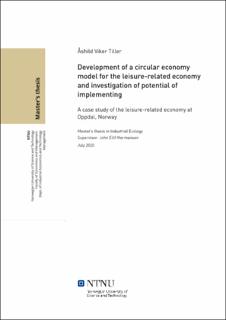Development of a circular economy model for the leisure-related economy and investigation of potential of implementing. A case study of the leisure-related economy at Oppdal, Norway.
Master thesis
Permanent lenke
https://hdl.handle.net/11250/2776934Utgivelsesdato
2020Metadata
Vis full innførselSamlinger
Sammendrag
Utviklingen av fritidsboliger og den menneskelige atferden knyttet til fritidsøkonomien er ressurskrevende og er under et stort press for å være mer bærekraftig (Vittersø, 2007). Utviklingen av fritidsboligene og livsstilen knyttet til disse gir miljøpåvirkninger og berører en rekke av bærekraftsmålene. Dette kan ha stor innvirkning på lokalt nivå, men også på globalt nivå. For å nå bærekraftsmålene innen 2030 må det skje en rask endring i forbruk og produksjon, og endringen må skje på lokalt og globalt nivå. Ressursforbruket og livsstilen i dagens samfunn er ikke bærekraftig, og det er derfor sirkulærøkonomi kan være et viktig bidrag til en bærekraftig utvikling.
Denne oppgaven undersøker bærekraften i fritidsøkonomien og potensialet av implementering av en sirkulærøkonomisk modell. I oppgaven blir en sirkulærøkonomisk modell for fritidsøkonomien utviklet. Denne modellen er hovedsakelig basert på teori om bærekraft, sirkulær økonomi, industriell økologi og forretningsmodeller. Oppgaven studerer en casestudie av fritidsøkonomi i Oppdal og studerer også Lundhytta for mer innsikt i byggingen av fritidsboliger. Casestudien analyseres ved hjelp av systemtenkning og sammenligner casestudien med modellen som er utviklet, casestudien analyseres også ved hjelp av SWOT-analyse, og til slutt blir forbindelsen mellom casestudien og modellen til bærekraftsmålene analysert.
Den utviklede modellen for sirkulærøkonomi i fritidsøkonomien er en forenkling, og gir dermed modellen usikkerheter, men modellen kan ha potensial til å bli brukt som et verktøy for å lede mot en sirkulær fritidsøkonomi. Trenden i analysen viser et potensial i økt deling og implementering av bærekraftig design og gjenbruk i forretningsmodellene. Modellen indikerer miljømessige og økonomiske fordeler ved å implementere en sirkulærøkonomisk modell i fritidsøkonomien, men det er avhengig av bevisstheten i markedet og insentiver til å bidra for virksomhetene og samfunnet. For å møte de fremtidige utfordringene som et begrenset område for fritidsboliger, arbeid med å minimere miljøbelastningen og tap av biologisk mangfold, trenger fritidsøkonomien å utvikle seg mot enda mer miljøvennlige løsninger. Implementering av en sirkulærøkonomisk modell i fritidsøkonomien kan øke potensialet for en bærekraftig fritidsøkonomi. Studien bidrar til med kunnskap om sirkulærøkonomi i fritidsøkonomien. Studien bidrar med mer kvalitativ innsikt enn mange andre studier på temaet. Studien prøver også å inkludere viktigheten av kompetanse og kunnskap i sirkulærøkonomi, noe som kan være fordelaktig for fremtidig forskning på området. The development of cottages and the human behaviour connected with the leisure-related economy is resource demanding and it is under a great pressure to be more sustainable (Vittersø, 2007). The development of the cottages and the lifestyle connected with this have an environmental impact and touches on a number of the sustainable development goals (SDGs). Environmental impacts may have great impact on a local level, but also on a global level. To contribute to achieve the SDGs by 2030 there need to be a rapid change in the consumption and production, and the change need to be on a local level as well as on a global level. The consumption of resources and the lifestyle on this planet is not sustainable and this is why a circular economy can be an important contribution towards a sustainable development in the leisure-related economy.
This thesis examines the sustainability in the leisure-related economy and the potential of implementing a circular economy model. The thesis developed a circular economy model for the leisure-related economy. The model is mainly based on theory about sustainability, circular economy, industrial ecology and business models. The thesis investigates a case study of the leisure-related economy at Oppdal, and for a more specific input on the cottage building, Lundhytta is investigated. The case study is being analysed using a system and comparing the case study with the developed model, the case study is also analysed by using SWOT analysis, and in the end the connection between the case study and the model with some SDGs are analysed.
The developed model for circular economy in the leisure-related economy is a simplification, thus giving the model uncertainties, but the model may have the potential of being used as a tool to guide towards a circular leisure-related economy. The trend in the analysis show an environmental and economic potential by increased sharing and implementation of sustainable design and reuse in the business models. The model indicates environmental and economic benefits from implementing a circular economy model in the leisure-related economy, but that is depended on the awareness in the market and incentives for the businesses and the community to contribute. However, to face the future challenges of limited area for cottages, minimizing the environmental impacts and biodiversity loss, the leisure-related economy needs to develop towards more environmentally friendly solutions. Implementing a CE model in the leisure-related economy may increase the potential of a sustainable leisure-related economy and to reach the SDGs by 2030. The study contributes with research on circular economy in the leisure-related economy. The research contributes with a more qualitative view than many other studies have done. The study also tries to incorporate the importance of competence and knowledge in the circular economy, which can be beneficial for future research in the field.
